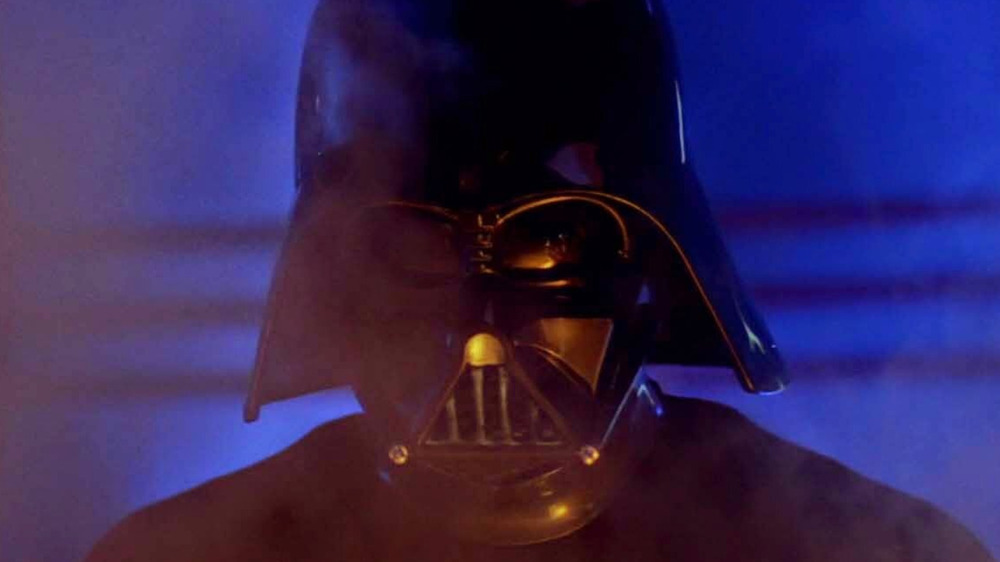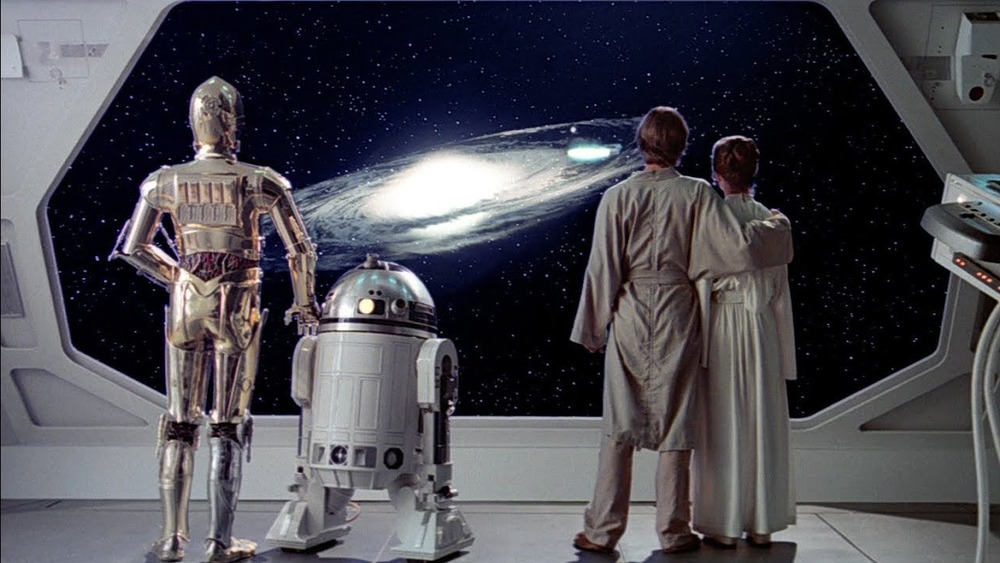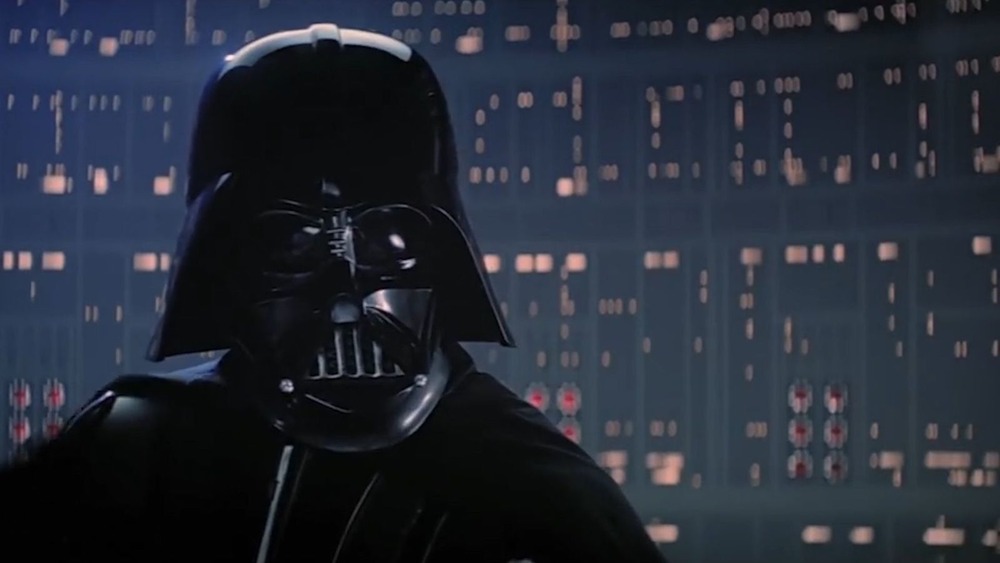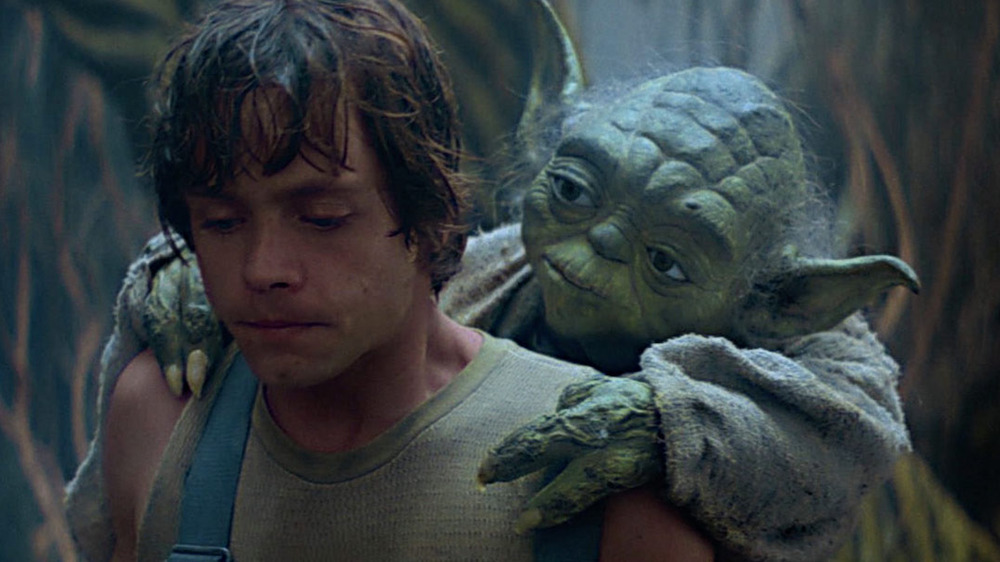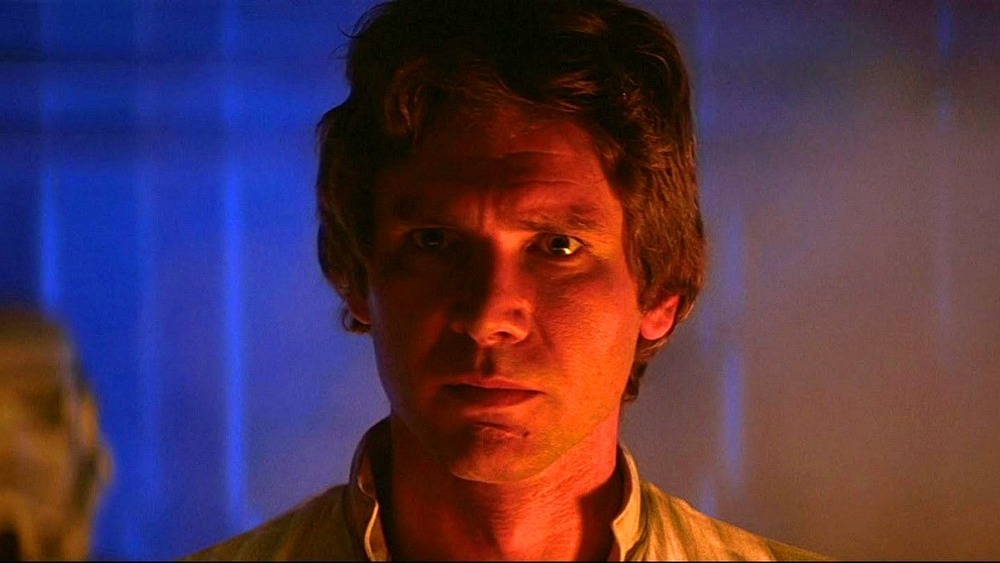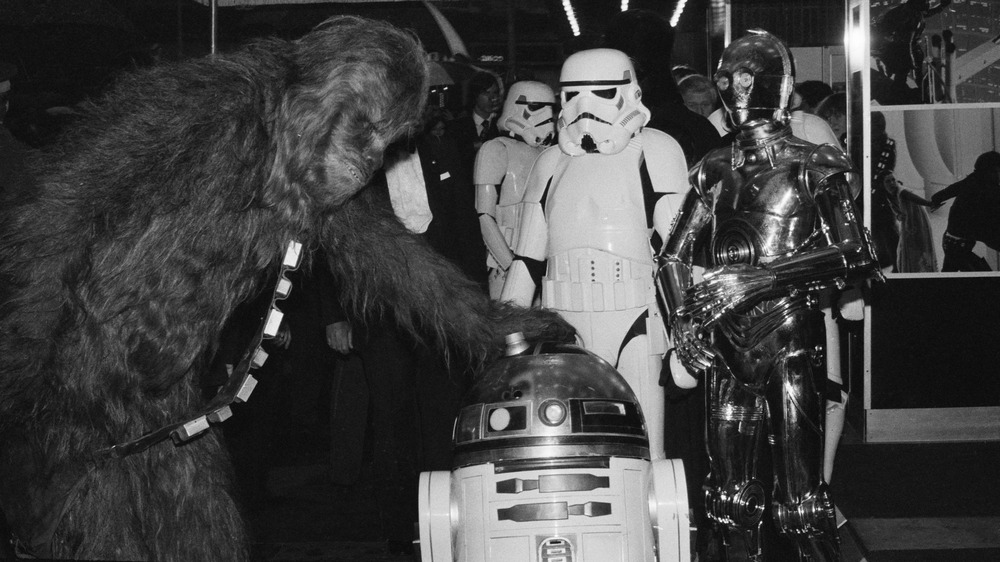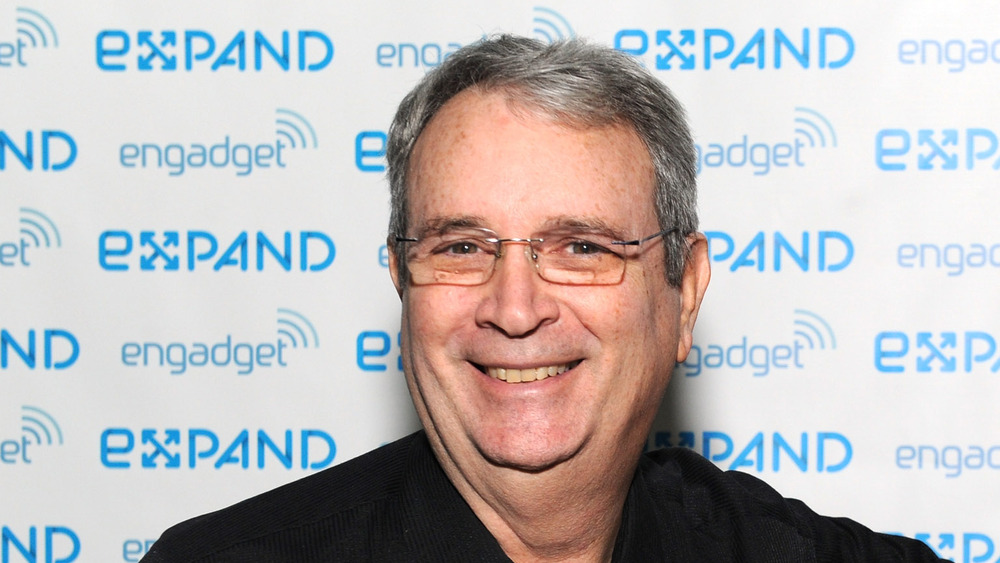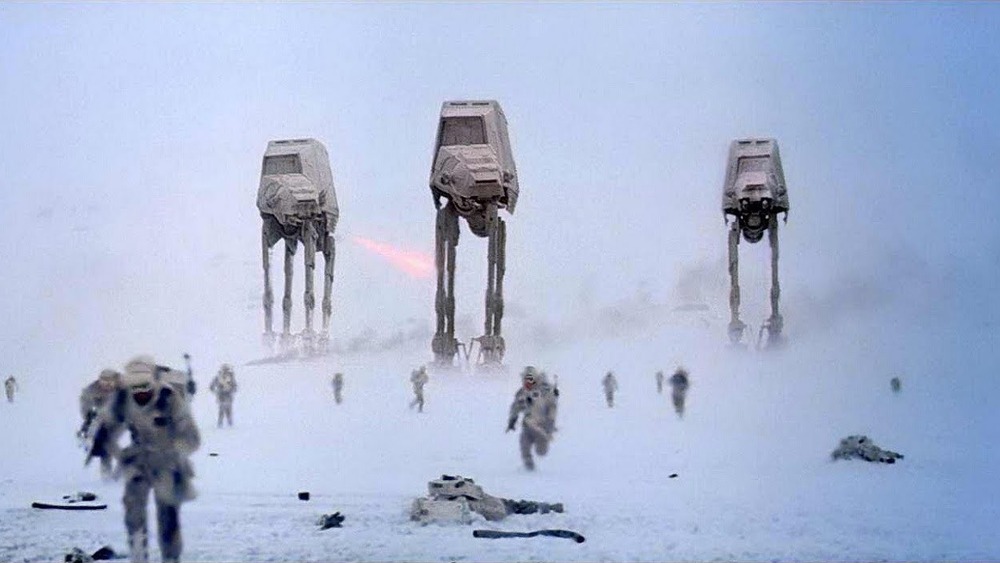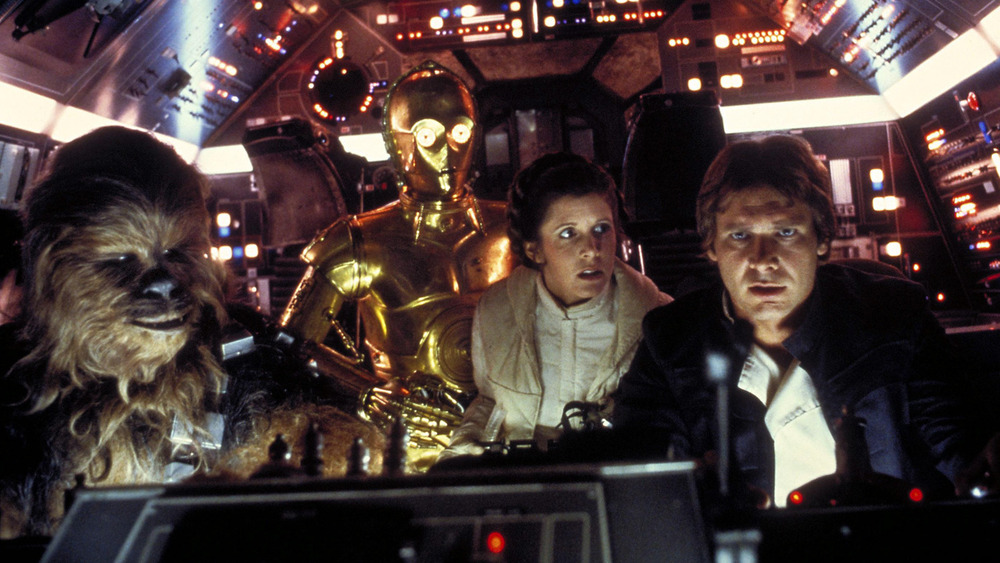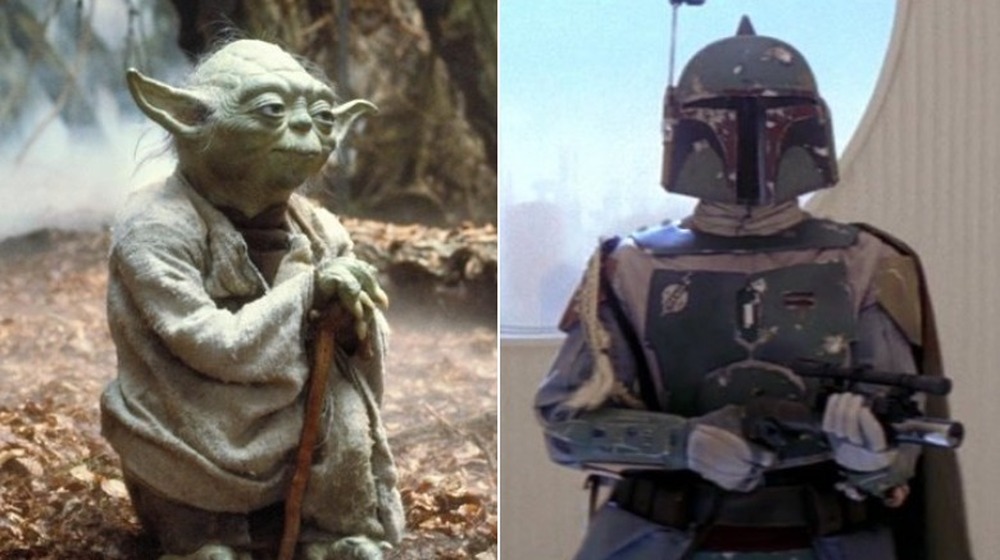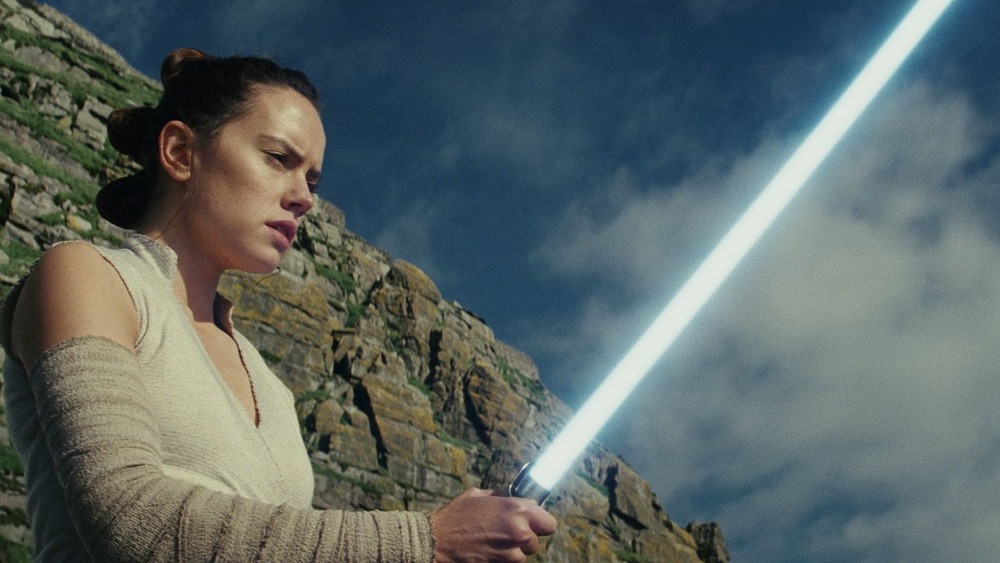What It Was Really Like To See The Empire Strikes Back In 1980
It's no secret that Star Wars: Episode V - The Empire Strikes Back is considered one of the greatest science fiction films, if not one of the greatest films, ever made. Released in 1980 as the sequel to the groundbreaking science-fiction/fantasy movie then known as Star Wars (now known as Star Wars: Episode IV – A New Hope), the story sees Han Solo (Harrison Ford), Princess Leia (Carrie Fisher), Chewbacca, and C-3PO in free fall, attempting to escape the ever-encroaching grasp of the Galactic Empire while Luke Skywalker (Mark Hamill) journeys to the swamp planet of Dagobah to train with (peculiar, wise, definitely not a baby) Yoda.
Empire Strikes Back has received much praise over the years, including being cited for what many people consider one of the greatest plot twists in cinematic history: when the villainous Darth Vader reveals to Luke, "I am your father."
When The Empire Strikes Back was first released in theaters on June 20, 1980, however, the world was a very different place. There were no cell phones, no internet and no movie blogs (gasp!). In those days, pretty much all a Star Wars fan could do while waiting for Irvin Kershner's masterpiece to hit theaters was send letters to the sci-fi magazine Starlog.
These written messages would appear in Issues #38-40. They are also why we're gathered here today — breaking down early Empire Strikes Back reviews from critics and fans gives unique insight not only into the thoughts surrounding the film's release, but intriguingly, how those comments parallel the divisive reception of 2017's Star Wars: Episode VIII - The Last Jedi.
Too many unresolved questions
While Empire Strikes Back is the middle chapter of a trilogy, many fans initially felt it left too much to interpretation.
One fan by the name of Sean Bernard wrote, "I know they wanted to leave something to settle in the other sequels, but they left a little too much. For instance, Han Solo's predicament. The movie should not have ended until Han was either killed by Boba Fett or Jabba or rescued by Lando Calrissian or Chewbacca, the former, preferably. Also, the fate of Bespin is not told. Was it taken by Lando's troops, taken by Imperial troops or destroyed by Vader?" Rather than waiting until the next sequel, fans such as Bernard wanted to already know the answers.
This criticism caught on, so Harrison Ford told Rolling Stone, "One of [series creator] George [Lucas]'s real strengths is not giving you all the information you need, yet at the same time not denying you anything essential. You have a feeling that you want to know more at all times. I have heard frequently that there is a certain kind of disappointment with the ending of the second film. I've heard people say, 'There's no end to this film' or 'I can't wait to find out what happens.' But they will, and that's exactly the effect intended by the ending." Of course, many of these questions were resolved in Return of the Jedi, so in the end, Ford was right.
I am your father reaction
The "I am your father" revelation from Empire Strikes Back is often considered one of the most shocking moments in movie history, especially for audiences who first witnessed it in 1980. One of the most evil men in the galaxy being the father of our hero? Who would have thought?
Some fans such as Starlog reader Robert L. Beedy-Scarola were even unsure about what they heard. "Is Luke related to Vader? Most think so now that Vader came right out and said it," wrote Beedy-Scarola. "Well, I say, do you believe everything you hear? Vader may have lied just to enlist Luke to his side. Vader would then dispose of Luke once he got what he wanted."
This twist was so shocking that not even most of the cast and crew knew about it ahead of time.
Those involved with the production of the film had a script where Vader said, "Obi-Wan killed your father," Mark Hamill explained on The Graham Norton Show in 2017. Hamill added that Kershner pulled him aside and told him that Darth Vader is Luke's father, a secret that at the time only Kershner and Lucas knew. Hamill elaborated on Twitter in 2020 that the revelatory line was dubbed, and he had to keep the secret for over a year. He also said on The Graham Norton Show that when Harrison Ford finally saw the moment at a screening, he turned to Hamill and said, "Hey kid, you didn't f——- tell me that!"
Who is another?
Some fans similarly got hung up on what Yoda meant when he said, "No, there is another." Although Starlog did not share many responses about the "another," the few they did publish were quite fascinating.
Bill Smith theorized, "Could it be Vader himself? Considering that there was an equilibrium of power between the good and dark sides of the Force, it would not be impossible to turn Vader into the antithesis of what he is now, especially if Luke (who, except for Yoda may be the most powerful member of the good side of the Force) is truly his son." That is an interesting theory and may not be entirely wrong considering what Vader does in the climax of Return of the Jedi. If Lucas were to answer this question, however, he would still likely say that Vader is not the other Jedi that Yoda referred to.
Keith Hoffman, on the other hand, wrote, "I suggest Princess Leia. She is young enough for the training; she withstood Darth Vader's tortures; she is dedicated to the cause; Princess Leia, not Lando, 'heard' Luke's cries for help; Han Solo is not in shape to be going anywhere for a while and he is too old. I wouldn't be surprised if in the third film, Leia, instead of Luke, destroys the Emperor. Of course, it will be the year 2000 before we find out." Well, some of Hoffman's theory was right — although the answer came much sooner than the year 2000.
Fans divided over I know line
"I know" is often considered one of the most clever improvised lines in movie history, but not everyone felt that way in 1980.
Starlog reader Jeanette Vogelpohl wrote, ". . . Somebody should tell Harrison Ford that when a woman passionately tells a man, 'I love you,' 'I know' is not an acceptable response. That scene was not funny, it was infuriating." Nancy Savula, however, called it "the best line since Rhett Butler's 'My dear, I don't give a damn.'"
One person who was not a fan of "I know" was George Lucas, as explained by Ford in a 2011 interview with Jon Favreau. The Han Solo actor told the future Mandalorian creator that Kershner shot two takes of the same scene: one where Han responded "I love you too," and the other with him responding "I know." According to Ford, Lucas went "apes–t" after he saw the cut of the film where Han said "I know," as he thought the line "would get a bad laugh."
To his credit, Lucas tested "I know" for a screening while Ford sat next to him. "There was a laugh, but it was a laugh of recognition," Ford would later recall. "And so, he generously let it stay in the movie." Looking back now, Lucas was right to keep that line in the film considering how beloved it is; that may also explain why he didn't change it for the multiple Special Editions.
Positive fan reactions
While The Empire Strikes Back initially received many negative-to-mixed reactions from fans, there were plenty of positive ones as well from people who recognized a masterpiece as soon as they saw it.
One such reaction comes from Starlog reader David K. Abernathy: ". . . After seeing TESB, I came away with a feeling that finally, after all these years, science fiction has been brought to the screen in all its glory. TESB is so rich, so full of mystery and excitement and, most of all, wonder. Each scene with Darth Vader and the Imperial fleet brought a feeling of awesome galaxy-spanning power, only previously expressed in Asimov's great novels. Experiencing the fantastic Yoda on the screen felt like the reading of the best of Tolkien. To me, TESB represents the first true science-fiction film, with all of its parts complete: the characters, the theme, the special effects and the magic. It has the right to be called the first science-fiction epic"
Another Starlog reader, Arlene Bahrenburg, wrote, "...Wow! That's my first reaction to The Empire Strikes Back. I didn't think they could do it, but they did. They made a movie that was better than the first Star Wars. More action, more dimension to the characters, more and better effects — everything that made Star Wars so great the first time, plus much more. The Force was certainly with George Lucas when he created this fabulous sequel." These sort of reactions, of course, would only become more common after the film's initial theatrical run.
Starlog writer's review
David Gerrold, a science-fiction author and Star Trek television writer, reviewed The Empire Strikes Back for Starlog #38 but was not very kind to the film. "Just about every other critic in the country has been telling you how good the picture is; they've been falling all over themselves to tell you. It's embarrassing," Gerrold addressed. "I feel guilty for not liking it as much as I'm supposed to."
Considering that Star Trek relies more on grounded science than Star Wars, Gerrold's criticisms of The Empire Strikes Back were mostly about its use of real-world logistics. "That asteroid isn't big enough to have a significant gravity well. I'll bet you could reach escape velocity by firing a double-barreled shotgun at the ground," wrote Gerrold. "And if the asteroid doesn't have gravity, then it can't hold an atmosphere. And even if our heroes are not breathing the atmosphere then they still need the pressure of an atmosphere on their bodies to keep from exploding." This is just one of Gerrold's criticisms about the movie's science.
Gerrold tried to justify these complaints with the explanation that this science-fantasy movie was using science-fiction devices. But ultimately, a movie with space wizards and super weapons is pretty much grounded in whatever reality it chooses to create for itself. Gerrold also criticized Luke's growth, but enjoyed other parts of the movie including the musical score, performances, production design and effects. Still, it's hard to look back now and not feel like he was the 1980's equivalent of Neil deGrasse Tyson.
Readers strike back
Obviously, many Starlog readers were not impressed with Gerrold's review and struck back hard in Issue #40. "...Mr. Gerrold complains about what he deems storytelling flaws in logic or science in TESB. As for the scientific misrepresentations, I can only say they don't matter. This is a fantasy movie," wrote Michael Mallory. "I also disagree on his conclusions regarding Yoda and Luke. He thinks Yoda's raising of Luke's submerged fighter was a mistake, a forfeited chance to teach Luke a lesson. Hey, even God gave Moses a helping hand. I'm tired of people faulting these films for not being intellectual enough. Who said they were supposed to be thought-provoking? Few films are perfect. Nitpicking (which is what many do mostly to show how above this sort of thing they are) is like criticizing an apple for not being steak when you're hungry for steak. It might be the best apple you ever tasted, but it's still lousy steak."
Some letters to Gerrold were nicer, but they didn't let him off the hook for his review. "...As much as I hate to admit it, most of David Gerrold's article was correct. But the Empire does not 'strike out,'" penned Charles "Atlas" Truog . "All I can say is that the errors should be taken into account as fantasy...except for the Millennium Falcon reaching Bespin without light-speed. That is a very clumsy mistake in an otherwise exceptional film." Hopefully, canon will give fans an explanation for that one discrepancy.
Critics were mixed
Critics were also initially mixed on The Empire Strikes Back. And some of them were downright savage about it.
"The Empire Strikes Back' has no plot structure, no character studies let alone character development, no emotional or philosophical point to make," wrote Washington Post critic Judith Martin. "It has no original vision of the future, which is depicted as a pastiche of other junk-culture formulae, such as the western, the costume epic and the World War II movie. Its specialty is 'special effects' or visual tricks, some of which are playful, imaginative and impressive, but others of which have become space-movie clichés."
Frederick S. Clarke of Cinefantastique magazine (via On Both Their Houses) was also not a fan. "The Empire Strikes Back is a lifeless copy of Star Wars propelled chiefly on the momentum of that earlier film. Without the likes of a Peter Cushing or Alec Guinness to add some dignity and solid support, Mark Hamill, Carrie Fisher and Harrison Ford flounder in roles that are certain to doom their careers regardless of the series' success," Clarke noted. "Critics who labeled this film 'better than Star Wars,' must have been watching the audience instead of the performance."
Spoiler alert: Harrison Ford's career did pretty okay after 1980.
But, like with the fans, there were some critics who loved Empire Strikes Back immediately. The legendary Gene Siskel of the Chicago Tribune gave the film three-and-a-half stars out of four, saying his only issues with it were "trivial compared to the strengths of the film, which are considerable and sometimes even majestic." That's a great way to describe the movie.
One critic confused Yoda with Boba Fett
The Empire Strikes Back was the cinematic introduction of two soon-to-be-iconic characters, Yoda and Boba Fett, but Arthur Knight confused them in his Hollywood Reporter review for the film! Knight's column started out smoothly as he called Empire Strikes Back "far and away the best of its kind since Star Wars itself," and said Kershner's direction made "the already familiar characters become more human, less like animated figures from the comic strips."
The confusion, however, occurred two paragraphs in: "As to the present episode, despite a couple of phoned in messages from Ben Kenobi (Alec Guinness) which, collected, must last all of 40 seconds, most of Luke Skywalker's good advice comes from a fascinating green-hued character named Boba Fett (Jeremy Bulloch) — and I'm still not certain whether he's a skillfully animated puppet or a real live human being. Whichever, he's one of Lucas' strongest assets in this Star Wars incarnation."
Looking back on the review now, it does begin with a disclaimer about the passage, but it is still a shocking conflation when you reflect on how ingrained the two have become in American pop culture. To his credit, Knight was correct that both kinda-green characters were "Lucas' strongest assets in this Star Wars incarnation."
Similarities to Last Jedi backlash
The initial reaction of The Empire Strikes Back is eerily similar to that of 2017's Star Wars: Episode VIII – The Last Jedi.
Both middle chapters of their respective trilogies tried to take the Star Wars franchise in exciting new directions, and both receiving mixed receptions from fans who were initially displeased with being knocked so far out of their comfort zones. Of course, the backlash against The Last Jedi was much louder, but the point still stands.
One Rotten Tomatoes user review of The Last Jedi (via BBC), for example, said: "So caught up in being diverse and political, it forgets to tell a coherent and compelling story." While no fans in 1980 complained about The Empire Strikes Back being too politically correct, there were similar complaints about the story not being coherent and/or compelling.
Mike Ryan of Uproxx mentioned in a 2019 interview with Last Jedi writer/director Rian Johnson that Empire Strikes Back also divided fans when it was first released, and the filmmaker admitted that he was initially disappointed with Empire, which was ironically the first Star Wars movie he ever saw. "My dad took me when I was really young to see A New Hope. Yeah, no, I remember, especially in the context of Return of the Jedi, which as a kid I adored," elaborated Johnson. "And so, yeah, I remember very vividly. But then Empire slowly became my favorite one." If history has taught us anything, then, perhaps The Last Jedi may someday be looked upon as fondly as The Empire Strikes Back.
